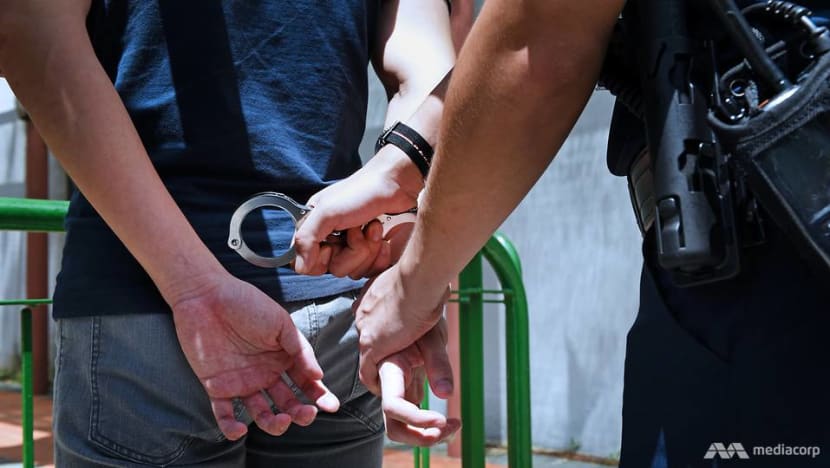Law targeting gangs that allows detention without trial extended for 15th time
The power to detain without trial is a "last resort" used in cases when victims or witnesses refuse to testify out of fear of reprisal, said Minister of State for Home Affairs Muhammad Faishal Ibrahim.

A police officer arresting a suspect in Singapore. (File photo: CNA/Hanidah Amin)

This audio is generated by an AI tool.
SINGAPORE: Parliament on Wednesday (Apr 3) voted to extend a law that allows the government to detain without trial people with links to certain criminal activity, especially gangs and secret societies.
This is the 15th time that the Criminal Law (Temporary Provisions) Act has been extended since it was enacted in 1955. It was last extended in 2018 for five years, until Oct 20 this year.
Opposition lawmakers from the Workers’ Party (WP) joined the People’s Action Party in voting for the extension.
This was a shift from the WP’s position in 2018 when it voted against the extension and other amendments to the Act.
The Progress Singapore Party (PSP) stressed the need for more safeguards against potential abuse of power, but it was not clear how the party voted on Wednesday.
“Our objection to the Bill has been conveyed by Mr Leong Mun Wai in his speech. We did not take the additional step to register our dissent again,” said a PSP spokesperson.
Minister of State for Home Affairs and National Development Muhammad Faishal Ibrahim said during the debate that the Act was first introduced in the 1950s, when gang activity was rampant in Singapore, and still remains relevant today.
Powers to detain those associated with certain criminal activities are "exercised carefully and sparingly”, said Dr Faishal, describing it as “an instrument of last resort”.
“The (Home Affairs) Minister must be satisfied that detaining a person under the Act is necessary in the interests of public safety, peace and good order. The power to detain someone under the Act is used only when prosecution is not viable, for example, because victims and witnesses refuse to testify for fear of reprisal,” he explained.
The number of detention and supervision orders issued under the Act has declined over the years.
From Oct 21, 2019, to Dec 31, 2023, 123 individuals were dealt with under the Act, with 86 detention orders and 37 police supervision orders issued.
“This was fewer than the number of cases in the same period of the previous term of the Act,” noted Dr Faishal.
“Even so, the number of orders issued is significant and the Act continues to be necessary and relevant, not only against secret societies but also other criminal activities such as unlicensed moneylending.”
STILL A BIG THREAT
There are still active secret societies in Singapore, although not in the numbers and scale in some other countries.
“Nevertheless, they are still a menace to law and order, public safety and security,” said Dr Faishal.
“They recruit young Singaporeans and engage in illicit activities and violent conduct. That is why we must continue to clamp down on them.”
Dr Faishal cited an incident in the wee hours of Nov 9, 2021, when gang members gathered at a rival gang member’s flat with deadly weapons including a machete, a knuckle duster and a karambit knife. As the member was not at home, they attacked his family members instead.
In another incident on the evening of Jan 8, 2022, a gang clash took place at Circular Road, with one member stabbing a rival's leg with a knife.
In both cases, gang members were dealt with under the Act, Dr Faishal said.
The Act has also been used against organised crimes such as unlicensed moneylending, with a number of leaders and financiers of an unlicensed moneylending syndicate detained in 2019. The group was linked to over 1,800 cases of debt harassment in Singapore.
“Without the Act, we would not have been able to do much against them. The victims and witnesses feared reprisal and were not willing to testify. The perpetrators would have been able to carry on with their violence and intimidation with impunity,” Dr Faishal noted.
He reiterated that the Act is used in cases where prosecution is not viable, as witnesses are unwilling to testify in court for fear of reprisal.
“Witness intimidation is a problem in Singapore too. Some countries have witness relocation and protection programmes. However, because Singapore is so small, witness relocation would not be feasible or effective,” he said.
SAFEGUARDS IN PLACE
Dr Faishal assured MPs that safeguards are in place in the exercise of the powers.
For one, the Public Prosecutor’s consent must be obtained for a detention order or supervision order. The official must be satisfied that prosecution is not viable, before allowing executive action to be taken under the Act, explained Dr Faishal.
There are also three committees, independent of the Ministry of Home Affairs (MHA), ensuring that detentions are necessary, he said.
The first committee scrutinises every detention and supervision order issued by the minister, examining evidence that was considered in issuing the order and submitting its report to the President to recommend the confirmation, variation or cancellation of the order.
“A second committee considers every confirmed detention order at least once annually. It will consider whether the detainee continues to pose a threat to public safety, peace and good order, and whether the detainee should continue to be detained or released,” said Dr Faishal.
A third committee reviews detention cases which are being considered for extension beyond 10 years, to determine if it is indeed necessary.
“The Act requires the committees to have regard to public safety, the protection of individuals, and the safeguarding of sources of information, in their deliberation,” added Dr Faishal.
Detainees are required to attend the first committee in person. They can be represented by lawyers and make representations to the various committees, he added.
Every decision made under the Act can be subject to judicial review, as was made clear when the Act was last amended in 2018, he said.
“I want to emphasise this point as I know that some members have raised their concerns as to whether the Act ‘ousts’ judicial review. It does not,” said Dr Faishal.
DEBATE ON INFORMATION, SAFEGUARDS
Opposition lawmakers Dennis Tan (WP-Hougang) and PSP Non-Constituency MP Leong Mun Wai asked MHA to clarify the circumstances under which the ministry was prepared to stop extending the detention powers.
Mr Tan said the WP was “in cautious support” of the Bill, but maintained its objections to amendments to the Act made in 2018, when it voted against the extension.
He recalled that in 2018, the WP had expressed concerns about amendments giving the Minister for Home Affairs the final say on whether detention is necessary.
The WP had also expressed concerns about the insertion of a schedule of criminal activities covered by the Act which “may allow the ministers to bypass” questions about the severity of the cases or the possibility of prosecution in court; and the expansion of the minister’s powers to criminal activities conducted overseas, he said.
Mr Tan noted that the present Bill did not seek to amend the Act, that the WP had supported the extension before the 2018 amendments, and that it accepted “the uncomfortable compromise that this law entails on the constitutional right to freedom”.
The WP lawmaker also asked for information on the use of the detention provision, such as a breakdown of detention and police supervision orders by criminal activity, and whether any public prosecutor has withheld consent for an order.
Dr Faishal replied that MHA generally does not release information about the use of the Act as it must “balance the call for transparency against the need to prevent prejudice to investigations and to keep witnesses safe”.
When Mr Tan asked if such information could be provided to MPs confidentially as they debate the Act every five years, Dr Faishal said MHA had to be “very careful” about what it shares given the complexity of organised and transnational crime.
PSP's Mr Leong proposed additional safeguards for MHA to require sitting Supreme Court judges to be on the advisory committees that review detainees' cases. This is currently the practice, but is not written into law, he said.
He also suggested giving the President discretionary powers in the making or extension of a detention or police supervision order. The President currently acts on the advice of the Cabinet in these matters.
Mr Leong also wanted to know if the Public Defender's Office – set up in 2022 – can represent detainees under the Act. Dr Faishal said detainees are not assigned counsel by the state, but can find their own lawyer, including pro bono representation.
Dr Faishal said the current safeguards were carefully considered and worked for Singapore. He said it seemed that the PSP was “not able to point to any abuse of the system”, and urged the NCMP to “stop pursuing theory” and focus on whether the law has worked.
Dr Faishal also said that the responsibility for law and order lies with the government rather than the President, and MHA therefore disagreed with Mr Leong’s suggestion.
Mr Leong later pointed out that the President currently holds discretionary powers under the Internal Security Act (ISA), which also provides for detention without trial.
Under the Constitution, if the government disagrees with an advisory board's recommendation that an ISA detainee be released, the President’s concurrence is required for continued detention.
In response, Dr Faishal reiterated that the detention provision has worked in its current form.
REHABILITATION AND SECRET SOCIETY RECRUITERS
Mr Louis Ng (PAP-Nee Soon) and Nominated MP Razwana Begum Abdul Rahim asked about the rehabilitation of detainees, including whether they have access to programmes for offenders who have gone through the regular court system.
Dr Faishal said detainees are housed at institutions in Changi Prison Complex based on their security risk and rehabilitative needs, and placed on programmes targeting “specific behavioural and offending needs”.
For example, detainees can receive job opportunities through Yellow Ribbon Singapore. They also have access to vocational training, religious counselling and education.
“Where required, detainees undergo the gang renunciation programme or psychological-based correctional programmes to increase their self-awareness and equip them with pro-social skills to change their offending ways,” he added.
Mr Murali Pillai (PAP-Bukit Batok) asked if MHA would consider using the detention provision against secret society recruiters who target youths.
Young people are the “oxygen or lifeblood” of secret societies, said Mr Murali. Citing a study he was involved in, he said that the entry age for secret societies ranged from as young as 11 to 18.
He added that secret societies have evolved methods specifically to target and recruit youths in communities and school settings. These activities start as “innocuous” social gatherings that lead to initiation ceremonies.
Noting that recruiting people to join an unlawful society is a criminal offence, he asked whether secret society recruiters could be detained if evidence was not forthcoming.
Dr Faishal said detention orders have been, and will continue to be, issued against secret society recruiters.
He said MHA views recruitment of youths into gangs as “particularly aggravating as this perpetuates the gangland lawlessness, while corrupting our youths”, and that police pursue both enforcement and prevention measures.
Community outreach programmes involve working with the Ministry of Social and Family Development, Ministry of Education and social service agencies.
Talks at schools, prison visits for “wayward youths” and their parents and guardians, and the Streetwise Programme for youths are among the police’s educational efforts.






















